The power of resilience: Yemeni families overcoming challenges against all odds
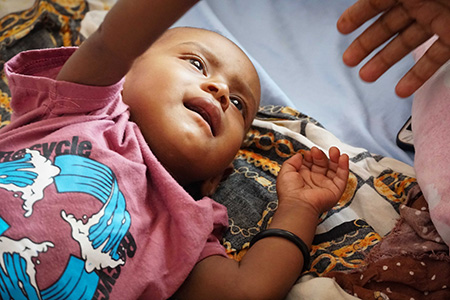 22 August 2023, Aden – Ahmed Abdel-Jabbar, a five-month-old baby, was admitted to Al-Sadaqa Hospital in Aden, Yemen yesterday, lethargic and suffering from severe diarrhea.
22 August 2023, Aden – Ahmed Abdel-Jabbar, a five-month-old baby, was admitted to Al-Sadaqa Hospital in Aden, Yemen yesterday, lethargic and suffering from severe diarrhea.
His mother, Fawzia Jamal, 30, has four children, and Ahmed is the youngest. Her husband washes cars to earn a living, but his work is not consistent. The family's income is unpredictable, and they struggle to make ends meet.
"For us, every day is a struggle. It's challenging to make plans since we never know how much money we'll have from one day to the next. We are often unable to pay our rent on time because it is a substantial burden for us. From food and clothing to medical care and education, we need so much for our kids. As a mother, I worry about it often and wish I could do more to support them,” Fawzia said.
Despite their financial difficulties, Fawzia is determined to do everything she can to keep her family healthy. When Ahmed fell ill, she brought him to Al-Sadaqa Hospital, where he received free medical care and treatment.
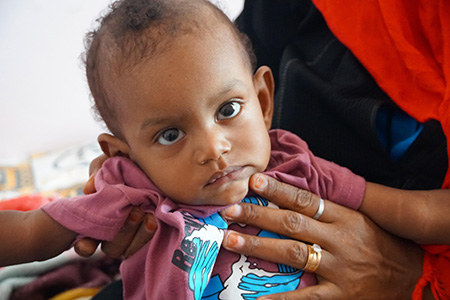 At WHO-supported Therapeutic Feeding Centres across the country, WHO is helping families afflicted by malnutrition by supplying vital health resources and support, providing a lifeline to those who are most in need. Malnourished children are provided with free nutrition and medical care, and mothers given guidance and advice on how to ensure their children are well-nourished even with minimal resources.
At WHO-supported Therapeutic Feeding Centres across the country, WHO is helping families afflicted by malnutrition by supplying vital health resources and support, providing a lifeline to those who are most in need. Malnourished children are provided with free nutrition and medical care, and mothers given guidance and advice on how to ensure their children are well-nourished even with minimal resources.
"We are committed to helping children and families impacted by malnutrition in Yemen,” said Dr. Athmar Al-Sakkaf head of the Therapeutic Feeding Centres at Al-Sadaqa Hospital. “We are members of our community, working to improve the lives of Yemeni families, and our team of skilled healthcare professionals is committed to offering life-saving treatment to millions of children like Ahmed who need our help to survive and thrive.”
Fawzia is grateful to the doctors in Al-Sadaqa Hospital for their assistance and care for her child.
"All I want is for my little Ahmed to be safe and healthy." He's so young and has already been through so much. I hope he heals quickly and returns to being the cheerful, energetic baby he always was. As a mother, it breaks my heart to see him so ill, but I am grateful for the assistance we have received here. I'm not sure what we'd do without them. I just want my baby to be okay, and I'll go to any length to ensure he has the care he needs," Fawzia said.
WHO completes consultations with Yemen health authorities for Country Cooperation Strategy 2024-2025
WHO completes consultations with Yemen health authorities for Country Cooperation Strategy 2024-2025
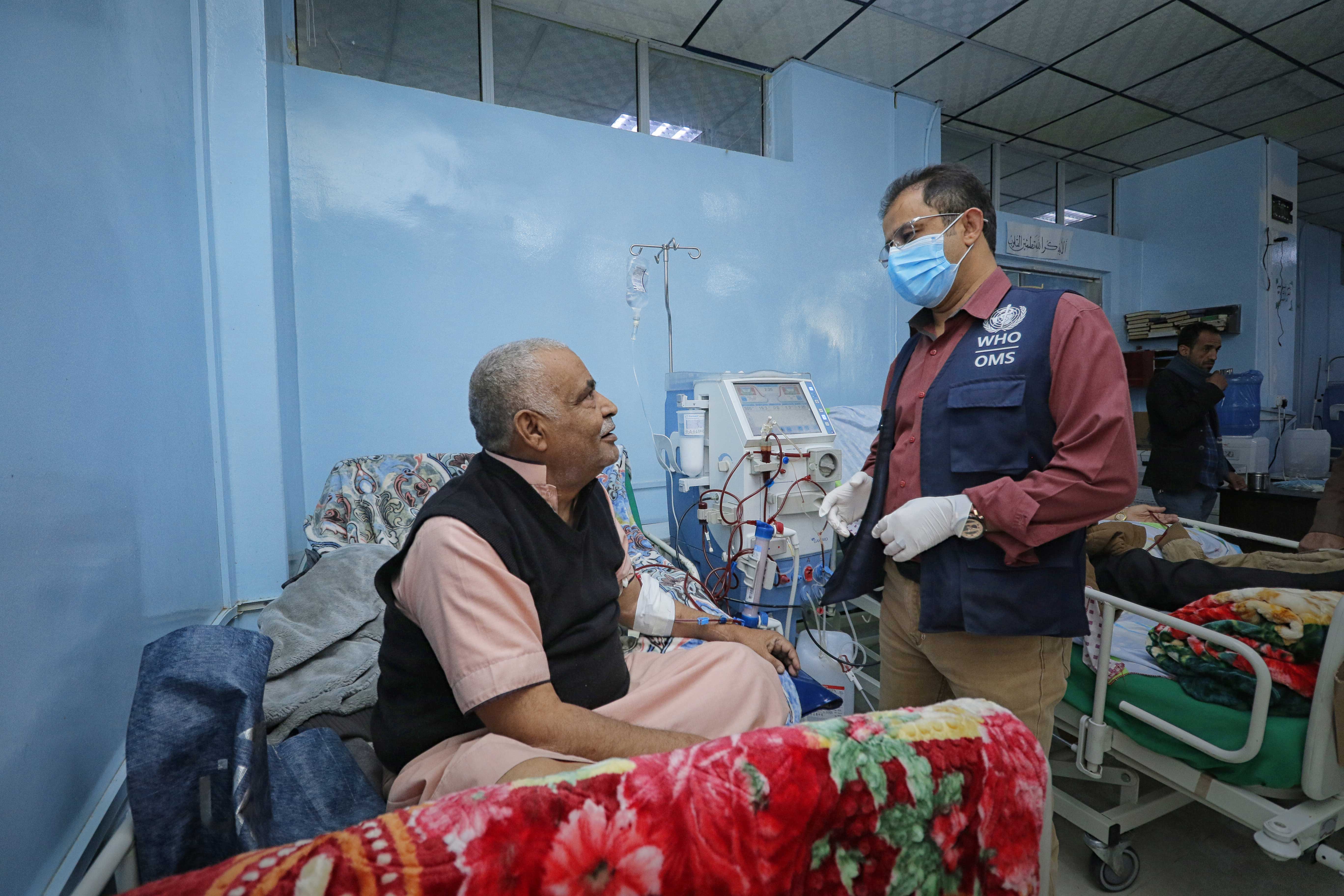 Yemen's fragile health system is heavily dependent on humanitarian aid to remain functional and provide life-saving services to millions of vulnerable Yemenis22 August 2023, Aden – The World Health Organization (WHO) has completed a series of consultations with the health authorities in Yemen with the goal of finalizing the Country Cooperation Strategy (CCS) for Yemen for 2024-2025. This important step signifies the commitment of WHO and health authorities to build on the current close collaboration to advance the health and well-being of the Yemeni people.
Yemen's fragile health system is heavily dependent on humanitarian aid to remain functional and provide life-saving services to millions of vulnerable Yemenis22 August 2023, Aden – The World Health Organization (WHO) has completed a series of consultations with the health authorities in Yemen with the goal of finalizing the Country Cooperation Strategy (CCS) for Yemen for 2024-2025. This important step signifies the commitment of WHO and health authorities to build on the current close collaboration to advance the health and well-being of the Yemeni people.
As the success of the CCS hinges upon active collaboration among WHO, health authorities, and other relevant stakeholders, further consultations are also planned by WHO in the coming weeks with donors and health partners to ensure support from all key stakeholders to foster and align synergies to advance universal health coverage and sustainable development in the health sector.
“As Yemen transitions across the humanitarian-development-peace nexus, the CCS for Yemen will serve as a strategic framework to complement national health priorities and guide the work of the health sector to apply WHO’s global health objectives at the country level. The development of the CCS for Yemen is a participatory process that involves extensive consultations with key stakeholders at the national and community levels, ensuring inclusivity and country ownership in the strategy's development,” said Dr Arturo Pesigan, WHO Representative in Yemen.
The CCS is designed to be consistent with the health-related Sustainable Development Goals (SDGs), aiming to ensure equitable access to quality healthcare for all. For Yemen, the draft CCS includes four joint strategic priorities and corresponding focus areas to guide the health agenda in Yemen over the next two years:
Provide health care to promote universal health coverage (UHC)
Protect the population by preparing for, detecting and responding to health emergencies
Promote healthier lives and well-being by addressing the determinants of health and risk factors
Promote a peace and health dividend to support resilient health systems and foster community engagement, social cohesion, partnership and collaboration
National health authorities in Yemen appreciated the consultation process, marking it as an important step for joint efforts to save lives by preventing, detecting and responding to health emergencies, promoting healthier communities and building a resilient health system.
In implementing this vision, WHO shall strive to forward evidence-based and innovative solutions that will lead to improved access to quality health services, with a focus on primary health care (PHC), leading to better health outcomes for all people in Yemen. Emphasis was also placed by national health authorities on the need to regularly review and evaluate joint health activities and maximize the use of available resources to find sustainable solutions to ensure self-reliance of the health care system.
Note to editors
The CCS is WHO’s strategic framework to guide WHO’s work in and with a Member State. It responds to that country's national health and development agenda, positions WHO’s work in Yemen in the context of the United Nations Yemen Sustainable Development Cooperation Framework (UNSDCF) 2022–2024 (UNSDCF) and WHO’s programme budget, and identifies a set of agreed joint priorities for WHO collaboration, with a focus on areas where the Organization has a role of facilitator and joint lead in UN support to accelerate implementation of the SDGs comparative advantage to assure public health impact.
In Yemen, the previous CCS expired in 2013 and has not been updated due to the prolonged conflict with subsequent humanitarian crisis. In November and December 2019, preliminary discussions between WHO and Yemen authorities aimed at developing a new CCS for Yemen started but were interrupted early 2020 due to COVID-19 pandemic. Priority was then given to developing and implementing the Yemen National COVID-19 Preparedness and Response Plan.
WHO has initiated the development process of the CCS in June 2023 and is adopting a fast-tracked approach, with the aim of launching the CCS before the end of 2023.
For more information visit: Yemen Health Emergency
Media contacts: WHO Yemen Communications,
About WHO: Since 1948, The World Health Organization (WHO) has been the United Nations agency dedicated to advancing health for all, so that everyone, everywhere can attain the highest level of health. WHO leads global efforts to expand universal health coverage, direct and coordinate the world’s responses to health emergencies and connect nations, partners and people to promote health, keep the world safe and serve the vulnerable.
Statement by Dr Arturo Pesigan, WHO Representative, on the occasion of World Humanitarian Day 2023
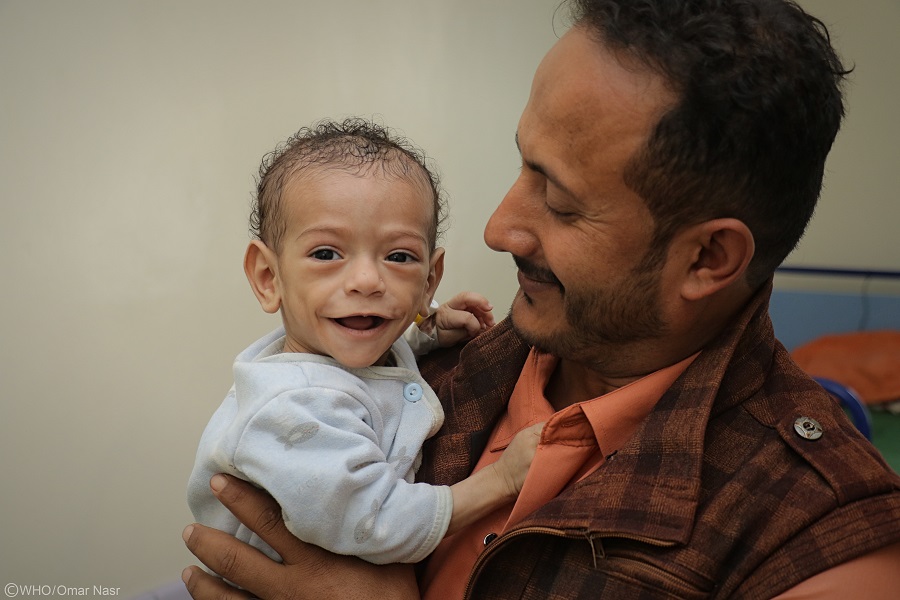
17 August 2023 – This year’s World Humanitarian Day theme – “No Matter What” – captures the unyielding commitment of the World Health Organization in Yemen, our steadfast donors and partners, the dedicated health staff working tirelessly every day, and the fearless communities we serve, all united in a shared mission to save lives and enhance health, regardless of the challenges that face us.
Our donors and partners, who enable WHO to continue its life-saving work, exemplify the true essence of humanitarianism. Their unwavering support fuels our efforts to strengthen health systems, enhance medical infrastructure, and empower health workers, ensuring that the most vulnerable receive the care they deserve.
Health workers, our heroes on the frontlines, deserve our deepest gratitude and respect. They confront immense challenges daily, often risking their own well-being to provide life-saving care. Their commitment to delivering quality health services, even in the most trying circumstances, is an inspiration to us all. The sacrifices they make are a testament to the value of human life and the importance of upholding the right to health.
Communities are the cornerstone of resilience in any crisis, and the Yemeni people have demonstrated extraordinary strength. They provide essential support to the health response, share knowledge, and play a pivotal role in safeguarding the health and well-being of individuals and families across the country. Communities in Yemen are not only responding effectively to challenges, but they are also laying the foundation for long-term recovery and sustainable development.
As we mark this day, let us renew our commitment to the principles of humanitarianism and solidarity. By working collaboratively, we can ensure that communities are at the forefront of decision-making and that health workers have the support and resources they need to deliver care effectively.
"No Matter What" reflects the unbreakable bond between WHO, our donors and partners, and the communities we serve. Through our shared commitment, unwavering dedication, and collective action, we can overcome the challenges that face us to save lives, promote health and well-being, and build a healthier, more resilient Yemen for all.
Battling malnutrition in Yemen: helping children recover and thrive
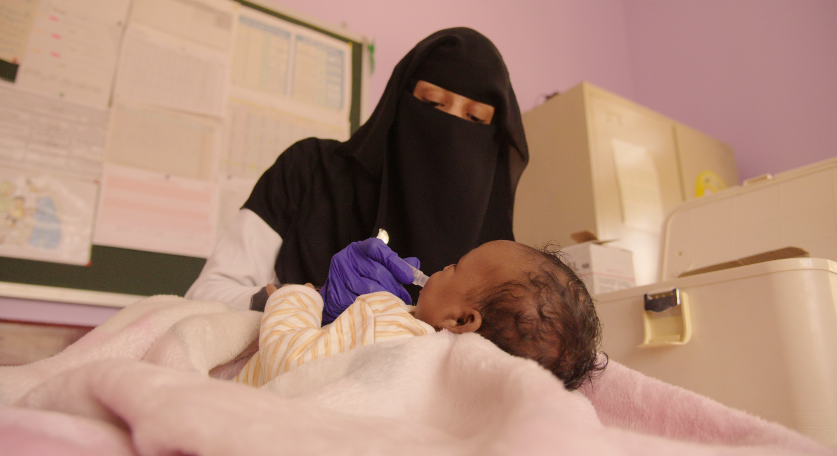 A female health worker providing treatment to one of the malnourished children
A female health worker providing treatment to one of the malnourished children
17 August 2023 – One of the most severe consequences of the conflict in Yemen has been widespread food insecurity and increasing numbers of malnourished children. The current level of hunger across the country is unprecedented, with 17 million Yemenis facing food insecurity. Child malnutrition in Yemen is among the highest in the world, with almost 2.2 million Yemeni children under the age of 5 acutely malnourished, including 538 000 children severely malnourished and 60 000 children suffering from critical medical complications as a result of severe acute malnutrition.
Agricultural activities, trade routes, and food supply chains have been disrupted, and food prices are spiking as a result of limited availability Before the conflict, Yemen was facing significant challenges related to food production and water scarcity. The situation now, after 8 years of conflict, is exponentially worse.








